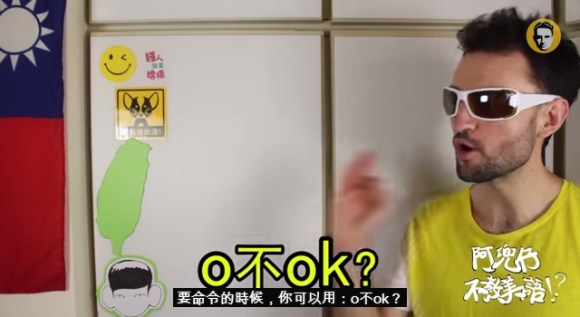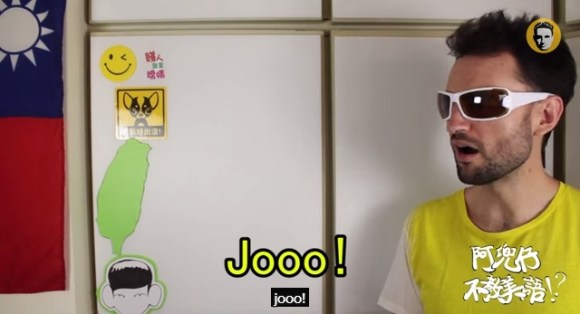
One of the best things about living overseas is the opportunity to learn the local lingo. By learning to communicate with the locals, it’s easier to get by day-to-day, and you’ll be able to unravel much more about the country’s culture. A Spanish YouTuber living in Taiwan shared a list of must-know pet phrases that he picked up by observing the locals. If you’re learning the Chinese language, starting a new phase in life in Taiwan, or even just imagining taking a trip to the lovely country, hit the “read more” button!
Our teacher for the day is Jesús Sandoval, a foreigner living in Taipei, Taiwan. He initially started his YouTube channel teaching Spanish to Chinese speakers, but his channel has evolved to focus more on interesting facts and information about Taiwan from a foreigner’s point of view.
▼ Jesús also calls himself 阿兜仔 (pronounced ah-doh-ah), which is a Taiwanese slang referring to Caucasian people.
In one of his recent episodes of 阿兜仔不教美語!(Foreigner doesn’t teach English!), he touched on lingo that the Taiwanese often use in daily life. He recalls his Chinese language teacher teaching him that the mandarin equivalent of “hello” is 你好 (ni hao), so he went around greeting people with that, but he later realized that the people around him never said 你好 on a daily basis (你好 is usually used when you meet people for the first time). When in Rome, do as the Romans do. When in Taiwan, speak like the Taiwanese! Here’s a list of phrases that Jesús thinks you must know if you’re living (or intend to live) in Taiwan!
1. 不好意思 (bu hao yi si)
Contextual meaning: I’m sorry; excuse me; pardon me
This phrase is pretty close to how the Japanese use the word “sumimasen“. You can use it in most daily situations; when you’re late for an appointment, when you’re asking for a favor, when you accidentally stepped on someone’s foot on a massively packed train, or even when you’re gloating over a quick win at a game of Uno.
2. 真的假的? (zhen de jia de)
Contextual meaning: Are you serious?; is that for real?
Not much explanation is needed for this simple phrase. When in doubt, use it. We mean that quite literally, like when you’re doubting the authenticity of some rumor.
3. 好誇張! (hao kua zhang)
Contextual meaning: That’s unbelievable!
Life is full of ups and downs, and when something in life exceeds your imaginations, that’s when you exclaim your surprise using this phrase. Like when we tell you that there’s a giant cat that weighs as much as an elementary school kid.
4. 嗯! (en)
Contextual meaning: Yes; okay; understood
Basically, this is the shortest reply you can give to anything you agree on, or in the case when you can’t be bothered to argue with someone. It’s as easy to use as giving a nod.
5. 我很忙 (wo hen mang)
Contextual meaning: I’m really busy
Can’t bring yourself to decline someone’s invitation? Use this. Don’t feel in the mood to take on extra tasks? Use this. In short, this is the most commonly used excuse to reject any request or invitation.
6. 我跟你說 (wo gen ni shuo)
Contextual meaning: Let me tell you
This is just a pet phrase that the Taiwanese use when they want their listeners to be at all ears to their words of advice. It doesn’t really hold any meaning or importance to the sentence structure. As Jesús mentioned in the example in his video, “if you’re not the one telling me, then who’s telling me? Nonsense.”
7. O不OK? (O bu OK)
Contextual meaning: Is that okay or not?; are you agreeable?; have you understood?
Jesús says that when you wish to casually order someone, or get them to follow your decision, use this phrase. Other than that, it can also be used to confirm the status or get an opinion on something. For example, when you go shopping with a friend and can’t decide whether to buy something, you can seek their opinion by asking “O不OK?”. “Like” RocketNews24 on Facebook, O不OK?
8. 你好機車! (ni hao ji che)
Contextual meaning: You’re ridiculous!; you’re being overbearing
Generally used in a negative context, when you’re offended or gravely annoyed by someone’s comment or question.
9. 屁! (pi)
Contextual meaning: Bullshit!
The word 屁 literally means fart, so it’s probably a fair guideline to say that you can use this expression whenever you think someone is farting out of their mouths. In other words, when you think someone is lying or bragging.
10. Jooo! (pronunciation is closer to “huh!”)
Contextual meaning: No way!
This isn’t even a Chinese word, but the Taiwanese often use it to express their displeasure or objection to something. We’d like to believe our readers would say this in the unfortunate case that RocketNews24 has to go on hiatus.
11. 好好吃! (hao hao chi)
Contextual meaning: This is delicious!
If something’s delicious, you have to say it out loud! We don’t think you’ll need further explanation for this.
12. 好口愛喔! (hao kou ai o) – 口愛 being a slang variation of 可愛 (ke ai)
Contextual meaning: So adorable!; sooo cuteee!
Other than exclaiming their love for delicious food, many Taiwanese also openly declare their affection towards cute stuff. Just like the Japanese tend to squeal “kawaii!!” at the sight of a small furry animal.
13. 好有趣 (hao you qu)
Contextual meaning: That’s interesting
Life is interesting! Especially when you’re living in a foreign country, you’re bound to find interesting differences big and small, and that’s when you can put this phrase to good use.
14. 你好討厭耶! (ni hao tao yan ye)
Contextual meaning: You’re so annoying!
This phrase can be used when you’re really annoyed with someone, for example, when your friend texts you to “come downstairs now!” but you end up waiting at the stairs for 15 minutes before they finally turn up. Or! It can also be used in a flirtatious way during lovey-dovey bickering.
▼ Watch the video!
If you’re learning Chinese, or want to know more about Taiwan, be sure to check out Jesús Sandoval’s other videos on YouTube, or follow him on Facebook (or his FB page for his YouTube channel)! Last we checked, he’s even mastered the Taiwanese dialect!
▼ 阿兜仔教台語!(Foreigner teaches Taiwanese!)
















 Taiwanese YouTuber’s punny pick-up line gets him a girl’s number in just 36 seconds
Taiwanese YouTuber’s punny pick-up line gets him a girl’s number in just 36 seconds Learn Japanese from YouTube: Amp up your listening skills with this four-step guide
Learn Japanese from YouTube: Amp up your listening skills with this four-step guide Starbucks Japan releases first-ever Hinamatsuri Girls’ Day Frappuccino
Starbucks Japan releases first-ever Hinamatsuri Girls’ Day Frappuccino Japan Extreme Budget Travel! A trip from Tokyo to Izumo for just 30,000 yen [Part 1]
Japan Extreme Budget Travel! A trip from Tokyo to Izumo for just 30,000 yen [Part 1] Japanese drugstore sells onigiri at pre-stupid era prices, but how do they compare to 7-Eleven?
Japanese drugstore sells onigiri at pre-stupid era prices, but how do they compare to 7-Eleven? Foreign tourists in Japan will get free Shinkansen tickets to promote regional tourism
Foreign tourists in Japan will get free Shinkansen tickets to promote regional tourism Japan Extreme Budget Travel! A trip from Tokyo to Izumo for just 30,000 yen [Part 2]
Japan Extreme Budget Travel! A trip from Tokyo to Izumo for just 30,000 yen [Part 2] We visit izakaya in Thailand billed as “Middle Aged Man’s Paradise”, try food that’s illegal in Japan
We visit izakaya in Thailand billed as “Middle Aged Man’s Paradise”, try food that’s illegal in Japan Tokyo’s Rikugien garden: Beautiful for 300 years, but especially in autumn after dark
Tokyo’s Rikugien garden: Beautiful for 300 years, but especially in autumn after dark W.T.F. Japan: Top 5 strangest kanji ever 【Weird Top Five】
W.T.F. Japan: Top 5 strangest kanji ever 【Weird Top Five】 Comparing the new made-in-China Oreos to the made-in-Japan ones we knew and loved【Taste test】
Comparing the new made-in-China Oreos to the made-in-Japan ones we knew and loved【Taste test】 Tokyo Skytree turns pink for the cherry blossom season
Tokyo Skytree turns pink for the cherry blossom season The 10 most annoying things foreign tourists do on Japanese trains, according to locals
The 10 most annoying things foreign tourists do on Japanese trains, according to locals Highest Starbucks in Japan set to open this spring in the Tokyo sky
Highest Starbucks in Japan set to open this spring in the Tokyo sky Starbucks Japan releases new sakura goods and drinkware for cherry blossom season 2026
Starbucks Japan releases new sakura goods and drinkware for cherry blossom season 2026 Japan’s new “Cunte” contact lenses aren’t pronounced like you’re probably thinking they are
Japan’s new “Cunte” contact lenses aren’t pronounced like you’re probably thinking they are Shibuya Station’s Hachiko Gate and Yamanote Line stairway locations change next month
Shibuya Station’s Hachiko Gate and Yamanote Line stairway locations change next month Yakuzen ramen restaurant in Tokyo is very different to a yakuza ramen restaurant
Yakuzen ramen restaurant in Tokyo is very different to a yakuza ramen restaurant Starbucks Japan adds new sakura Frappuccino and cherry blossom drinks to the menu
Starbucks Japan adds new sakura Frappuccino and cherry blossom drinks to the menu Japan just had its first same-month foreign tourist decrease in four years
Japan just had its first same-month foreign tourist decrease in four years Burning through cash just to throw things away tops list of headaches when moving house in Japan
Burning through cash just to throw things away tops list of headaches when moving house in Japan Japan’s newest Shinkansen has no seats…or passengers [Video]
Japan’s newest Shinkansen has no seats…or passengers [Video] Foreigners accounting for over 80 percent of off-course skiers needing rescue in Japan’s Hokkaido
Foreigners accounting for over 80 percent of off-course skiers needing rescue in Japan’s Hokkaido Super-salty pizza sends six kids to the hospital in Japan, linguistics blamed
Super-salty pizza sends six kids to the hospital in Japan, linguistics blamed Starbucks Japan unveils new sakura Frappuccino for cherry blossom season 2026
Starbucks Japan unveils new sakura Frappuccino for cherry blossom season 2026 Take a trip to Japan’s Dododo Land, the most irritating place on Earth
Take a trip to Japan’s Dododo Land, the most irritating place on Earth Naruto and Converse team up for new line of shinobi sneakers[Photos]
Naruto and Converse team up for new line of shinobi sneakers[Photos] Is China’s don’t-go-to-Japan warning affecting the lines at a popular Tokyo gyukatsu restaurant?
Is China’s don’t-go-to-Japan warning affecting the lines at a popular Tokyo gyukatsu restaurant? Survey asks foreign tourists what bothered them in Japan, more than half gave same answer
Survey asks foreign tourists what bothered them in Japan, more than half gave same answer Japan’s human washing machines will go on sale to general public, demos to be held in Tokyo
Japan’s human washing machines will go on sale to general public, demos to be held in Tokyo Starbucks Japan releases new drinkware and goods for Valentine’s Day
Starbucks Japan releases new drinkware and goods for Valentine’s Day We deeply regret going into this tunnel on our walk in the mountains of Japan
We deeply regret going into this tunnel on our walk in the mountains of Japan Studio Ghibli releases Kodama forest spirits from Princess Mononoke to light up your home
Studio Ghibli releases Kodama forest spirits from Princess Mononoke to light up your home Major Japanese hotel chain says reservations via overseas booking sites may not be valid
Major Japanese hotel chain says reservations via overseas booking sites may not be valid Put sesame oil in your coffee? Japanese maker says it’s the best way to start your day【Taste test】
Put sesame oil in your coffee? Japanese maker says it’s the best way to start your day【Taste test】 No more using real katana for tourism activities, Japan’s National Police Agency says
No more using real katana for tourism activities, Japan’s National Police Agency says